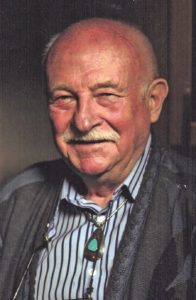Donald E. Butterfield, a retired Boston physician, researcher, and amateur astronomer, died peacefully at his home in Provincetown on May 21, 2022. He was 90.

The only child of Merton Weiss Butterfield and Gladys Victoria (Englund) Butterfield, Don was born on April 14, 1932 in Wauwatosa, Wisc. Because his mother died when he was six and his father sent him to live with friends until he remarried a year later, Don felt somewhat isolated as a child. School proved the place where the world began to open for him.
His sixth-grade teacher, Mrs. Lawrenson, recognized his vocal talents and cast him in musical plays — as Sir Joseph Porter in HMS Pinafore, Koko in The Mikado, and Figaro in The Barber of Seville, among others. He subsequently won several state oratory championships in Wisconsin.
Don was nevertheless a shy boy who had difficulty making friends. When he was in eighth grade, he learned from reading Ben Franklin’s autobiography that, to be a friend, one must put the interests of others first. That became his guiding principle.
On dark nights, Don would study the constellations and organize meteor watching parties for friends. Astronomy became a lifelong passion; as an adult, he traveled the world to observe eclipses, and he became a member of the Hubble Circle, a university consortium that helped fund the giant Magellan Telescope atop Chile’s Cerro Las Campanas.
Don graduated from high school in 1950 and entered the University of Chicago to study physics. He learned that his math skills were not up to the standards of Chicago’s world-class program in astrophysics, so he changed his major to pre-med. After he graduated in 1953, he went on to Harvard Medical School, receiving his M.D. in 1958.
Specializing in general surgery, Don was a resident at Boston City Hospital and Mass. General Hospital while mentoring pre-med students at Harvard’s Kirkland House. While still a medical student, he studied the effects of acidosis on the circulatory systems of dogs. The results, published in the Surgical Clinics of North American Journal, changed the way cardiac patients were treated and saved thousands of lives.
In the late 1950s, a friend signed Don up for scuba lessons, and within a decade he found himself training scuba instructors throughout New England in diving’s physiological challenges.
In 1963, he co-authored two articles for the New England Journal of Medicine on the pathophysiology of scuba diving. His expertise in scuba physiology and his medical training resulted in restructuring how to manage dives under pressurized air to eliminate the “bends.” That work enhanced his role as the on-site doctor for the Perini Co. for the construction of the Callahan Tunnel under Boston Harbor starting in 1960.
In 1964, Don wanted a break from medicine. He embarked on a three-month European tour before accepting the position of doctor and chief scientific officer on the Dante Deo, an 87-foot two-masted schooner about to set out on an 18-month around-the-world trip to research the pharmacological potential of sponges.
“It was not until 1965 when I began my Dante Deo chapter,” Don recalled, “that my life really began.”
On a later trip, Don severed his Achilles tendon in Japan. With time on his hands, he learned about a U.S. government program to provide surgical training to Vietnamese doctors and spent eight weeks in the Mekong Delta. Afterwards, he said, “I suspect that I treated both Vietcong and South Vietnamese patients.”
In 1967, Don returned to Boston to begin his medical practice. He ran a clinic at M.I.T. but found the political and competitive aspects of hospital-based surgical practice frustrating.
By that time, Don had fully embraced his homosexuality after more than two-decades of struggle. Over the next decade, he focused his medical talents on gay activist causes, first as the founding president of the Community Research Initiative of New England (CRI-NE), focused on HIV research, later as staff physician at the Fenway Community Health Center, and finally as President of Gay and Lesbian Physicians of New England (GaLPoNE).
After a 30-year career in medicine, he retired in 1979 and bought his house in Provincetown. For much of his life, Don collected art, having bought his first painting from a Haitian artist in 1970. His collection includes works by Paul Resika, Ken Beck, and Paul Nagano, among others. Several years ago, he donated a few sculptures to the Provincetown Art Association and Museum, including Twisting Force by Joseph Kurhajec, which rests on the deck at the front of the building on Commercial Street.
For Don, art functioned as a form of friendship. “I bought art that spoke to me from living artists whom I knew,” he wrote in his memoir. “I always bought from the artist, whether directly or through a gallery, because I wanted artists to benefit from the sale.”
He leaves his close friend and companion of 45 years, Ken Ishiwata of Provincetown, and many other friends locally and around the globe.
At his request, there will be no services.
To share a memory or leave an online condolence, visit gatelyfuneralservice.com.
